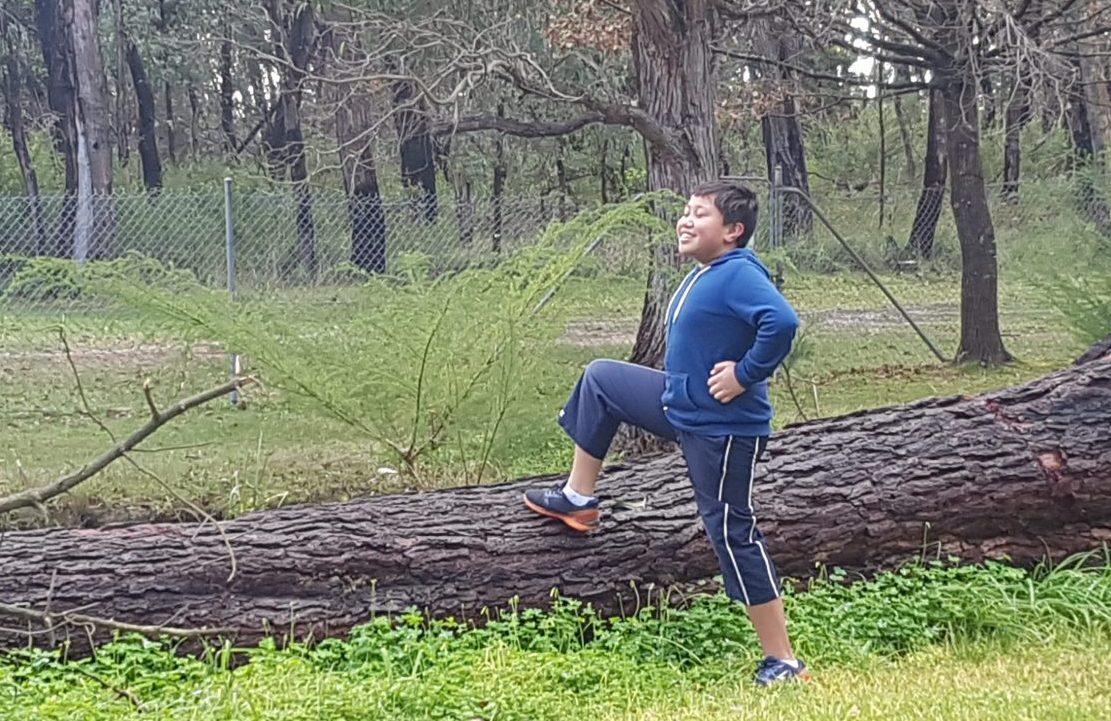
How dealing with autism has made my life more enjoyable

My son Caleb is nearly 13 years old. Since his diagnosis of Autism Spectrum Disorder at the age of 4, our family has been privileged to grow and learn with him as he deals with everyday living.
Caleb has Global Developmental Delay & Severe Language Disorder which makes everyday communication for him challenging. His speech is intelligible enough to us, as we “speak Caleb”. To anyone else outside of family or school, he may be hard to understand, as he speaks with an enunciated lisp and tends to speak about many different things at once, so his intentions are not always clear. Caleb’s pragmatic language skills are severely impaired, so he is unable to say things and do things in the appropriate manner to communicate effectively with the world around him.
Caleb has no sense of personal space or the relevance of quiet time at night. Recently he woke us at 3 a.m. to show us his “cool drawing” – he has been told many times not to wake us during the night unless he needs us or there is an emergency. This is a work in progress. When Caleb gets excited, everybody has to know why!
Recently Caleb learned a new ‘magic trick’, that involved bending the two opposing thumbs and covering the joint as you pull them apart like they have been severed. As soon as Caleb hears the word magic, this trick is shown to everybody within earshot, and he laughs repeatedly like he’s seen it for the first time…every time!
When taking Caleb swimming at the local pool, he always gets so excited about going, so much so one woman once asked if it was his first time. He’s standing beside me with his fists clenched in excitement, bouncing on the balls of his feet, with a hundred watt grin!

Caleb is also very literal. One day after being upset at being told to go to bed early, he left us a note saying he was running away to find a new family. We searched frantically for an hour when police advised us he was 5 houses up the road. He had knocked on a stranger’s door with tears streaming down his face and proclaimed, “My name is Caleb Busby and I need a new family.” It was our good fortune these people were kind enough to invite him in while they alerted the police, as they had no idea where he had come from.
Advising Caleb of appropriate behaviour normally happens a few days in advance of any event he will be attending. This is reinforced throughout the week leading up to the event and even right before we disembark from the car at the event. No matter how much he has been told though, he will forget, and that again is part of his condition.
Being a part of a big family has been advantageous for Caleb growing up, though he has had to cope with a pecking order that is inevitable in large families. As the youngest of 6 boys, he is conveniently sandwiched in age between his two sisters. While his younger sister is 3 years his junior, he has accepted that she outranks him too, and the girls seem to have unwittingly accepted the responsibility of supervising his actions, speech and behaviour in our absence. This has meant he has someone to watch over him as he does his chores to ensure it is being done right and to the expected standard.
We have tried to raise Caleb like the rest of his siblings. He will attend church, school and participate in family activities like everyone else. He will mostly eat what is given him and will dress appropriately. When he was younger he refused to wear clothes as it hurt his skin. Now, Caleb tends to stick to his favourite pieces of clothing. Despite the variety hanging in his wardrobe, sometimes making him change his clothes after he’s determined what he’s wearing to an event can be fuel for a meltdown. So we pick our battles. For the most part, he can wear what he wants as long as it’s clean and not too wildly inappropriate, like the plastic water gun he wants to take to the mall to play Halo in real life.
Having Caleb stay on task requires constant supervision and encouragement. If he finds activities overwhelming then gentle persuasion and an explanation (again) of why it is required has to be given. If he understands and accepts the explanation he will attempt the task; this doesn’t always mean he will be able to complete the task. However, the fact that he will attempt it is a huge success in itself. If he doesn’t accept your explanation then tears, feet stomping and loud wailing will ensue… And he can hold the hurt for a whole day.
We as parents are not immune to the negative reactions to Caleb’s quirkiness. We see the sneers and hear the snide remarks that people make about him, and that saddens us. But we also see the joy he brings to others too. Caleb has enriched our lives with stories much like the ones I have shared today. He wants to travel. He loves animals. He wants to race cars. He loves video games & Captain Underpants. He has a beautiful singing voice. He cries at cruelty and is jubilant when the good guys are victorious. He is a loyal friend and makes friends wherever we take him. Caleb’s condition doesn’t define him. It endears him to many. The more we are around him, the more he opens our eyes to the wondrous world he lives in and the innocence that is him.












Recent Comments